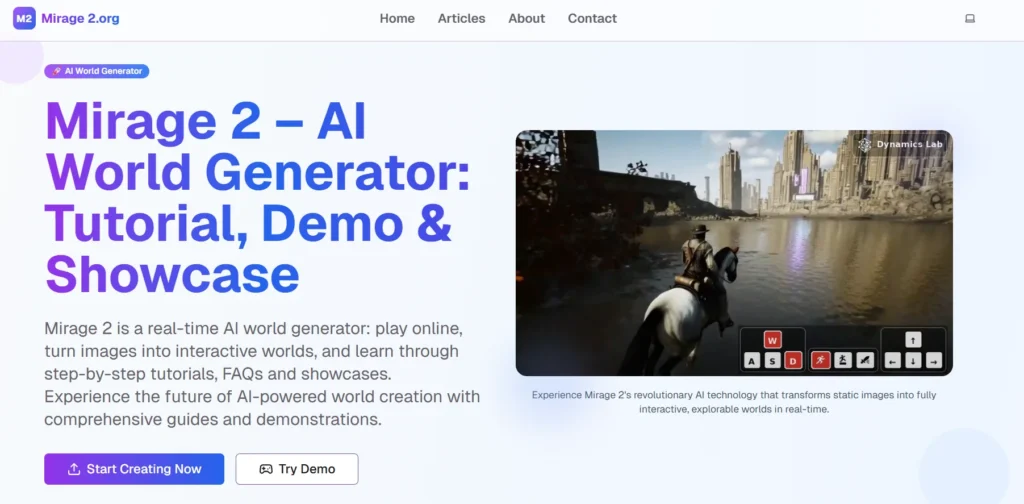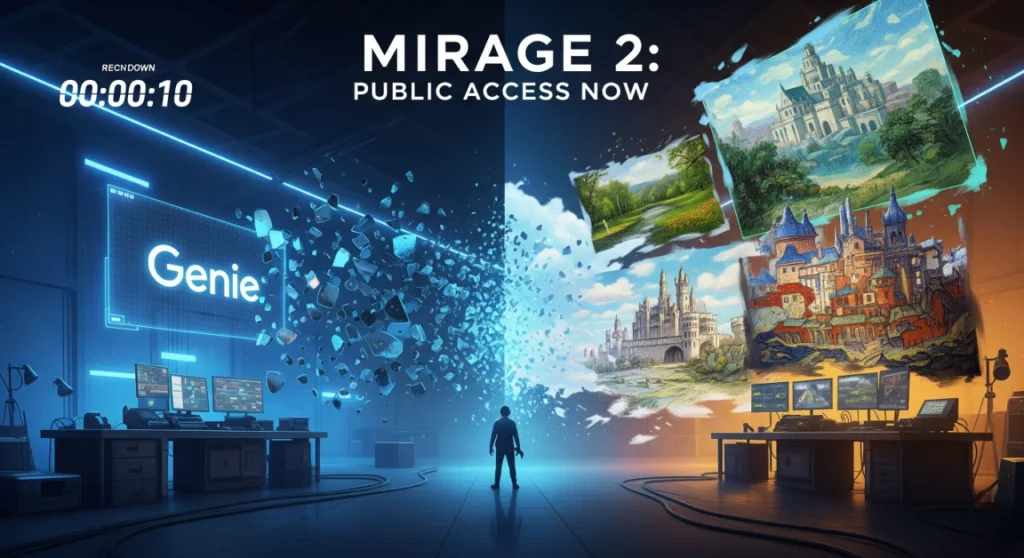A little-known lab may have just leapfrogged Google in AI gaming.
Dynamics Lab has released Mirage 2, an AI engine that transforms any image—photos, sketches, even paintings—into a playable world in seconds. Unlike Google’s Genie, which remains limited to research groups and short demos, Mirage 2 is available now to anyone online.
Key Takeaways
- Mirage 2 converts any image into a real-time playable game world.
- Unlike Google’s Genie, it’s free and open to the public today.
- Worlds last 10+ minutes, far outpacing Genie’s 20-second demos.
- Dynamics Lab’s fast release strategy could disrupt big tech gaming.
- Potential use cases extend beyond gaming to training and marketing.
Mirage 2, launched by Dynamics Lab, is an AI engine that instantly turns any uploaded image into a unique, playable game world. Unlike Google’s Genie, which remains limited to short research previews, Mirage 2 is free, public, and supports real-time gameplay lasting over 10 minutes, making it the first usable AI gaming platform available today.
Mirage 2 vs Google Genie: The AI Gaming Showdown
The gaming world just witnessed a potential shift in power. While Google has been carefully showcasing its experimental Genie AI, a little-known company called Dynamics Lab has released Mirage 2—a platform already playable by anyone online.
The difference?
Google’s Genie 2 and Genie 3 are research-limited tools whose game worlds collapse within seconds. Mirage 2 offers free, accessible gameplay that lasts over 10 minutes—long enough to feel like a real game, not just a tech demo.

How Mirage 2 Works
The process is deceptively simple: upload any image—a photo, a child’s doodle, even Van Gogh’s Starry Night—and Mirage 2 generates an interactive world around it in real time. Players can type commands, and the world shifts instantly.
Unlike traditional engines, Mirage 2 doesn’t preload environments. Instead, it generates each frame as the game unfolds. That means no two players ever experience the same world, even if they start from the same image.
Why This Matters
Google’s Genie research showcases advanced simulation capabilities, but its rollout is cautious. Genie 2 lasts only 10–20 seconds, Genie 3 extends to a few minutes, and both are available to limited groups of researchers.
By contrast, Mirage 2 is out in the wild—accessible, free, and functional today. That openness could give Dynamics Lab a crucial first-mover advantage.
The Bigger Picture Beyond Gaming
While gamers may be the first to benefit, the implications are far broader.
- Educators could turn history lessons into interactive adventures.
- Marketers might create branded game-world experiences instead of static ads.
- Businesses could train staff using AI-generated simulations.
This blurs the line between game engines, learning platforms, and enterprise software.
Expert Context: Why Google Is Holding Back
Industry watchers suggest that Google is moving cautiously due to risks around copyright, safety, and content quality. AI-generated games may borrow from training data, raising unresolved legal questions. Visual glitches and unstable physics also remain challenges.
Dynamics Lab, however, is taking the opposite approach: releasing early, iterating fast, and gathering user feedback in real time.
Future Outlook: Mirage 5, Genie 4, and Beyond
Today’s Mirage 2 already surpasses early demos, but the road ahead could be even more dramatic. Developers predict future versions may generate complex RPGs, strategy titles, or even AI-driven sports games.
If that happens, traditional game studios—who often spend years developing a single title—may face competition from AI models that generate near-infinite experiences instantly.
Conclusion
For now, Mirage 2 is more proof-of-concept than polished blockbuster. But its availability marks a turning point. While tech giants like Google and Microsoft slow-walk their AI game research, Dynamics Lab has opened the gates for anyone to experiment.
The message is clear: AI isn’t just reshaping how we play games—it’s redefining who gets to create them.
